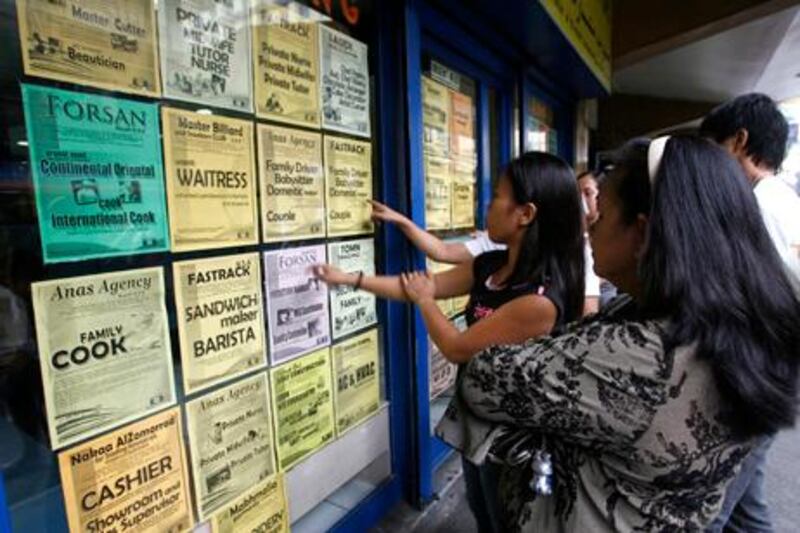ABU DHABI // The Philippine government says it will not be reducing the minimum wages of its domestic workers abroad, despite calls by a recruitment coalition for a decrease.
"The US$400 [Dh1,469] monthly minimum wage for household service workers is a requirement adopted in 2006," Danilo Cruz, the labour undersecretary, said in Manila yesterday. "A move to decrease it is out of the question."
The Philippine Overseas Employment Administration (POEA), which promotes and monitors overseas employment, issued the minimum wage in December 2006 as part of efforts to protect Filipinos working abroad. The minimum wage was increased from $200.
Mr Cruz, who served as the labour attache in Abu Dhabi from 1990 to 1996, said $400 was a "reasonable" amount.
"Their jobs are really difficult," he said. "They do not have an eight-hour job, cater to a large household and do not get any overtime pay."
His comments followed a proposal by foreign recruitment agencies and employers in some countries in the Middle East to reduce the $400 monthly wage to $300.
Lito Soriano, the chief executive of LBS Recruitment Solutions Corporation in Manila, made a goodwill tour of the Middle East earlier this month and said employers and recruiters could not comply with the government-set minimum.
"It's not working," he said. "Those who attended the workshops said $300 could be worked out."
Mr Soriano, who is also the adviser to the Coalition of Licensed Agencies for Domestic Services (Clads), accompanied the group to Qatar, the UAE and Kuwait to meet Filipino diplomats and recruitment agencies that deal with Filipino household service workers.
At the moment, Clads does not expect the Philippine government to reduce the household workers' minimum wage, he said. "But we will encourage and help in the bilateral discussions on the issue of acceptable salary rates."
Emma Tagboy, 30, a Filipina housemaid in Dubai who has a monthly salary of Dh1,800, said it was unfair for recruiters to ask the Philippine government to reduce the minimum wage. Instead, they should request an increase.
"Four hundred dollars isn't even enough," she said. "Prices have gone up while the exchange rate of the peso against the dollar is low."
Every month, Ms Tagboy sends 15,000 pesos (Dh1,270) to her parents, who take care of her two-year-old son in Pagadian City, in the southern Philippines. She and her sisters, who are also housemaids in Dubai, send home a combined 50,000 pesos a month.
Yum Habana-Sabala, the managing director of Destiny HR in Dubai, said she declined applications from prospective employers who offered less than $400. She said she focused more on hiring skilled and professional workers. "I usually explain to them that it's prescribed by our law," she said. "But they say it's only on paper. In reality the maids are paid Dh700 to Dh800 a month."
There are many recruitment agencies that are breaking the rules in an attempt to earn more profit, said Emmanuel Geslani, an overseas recruitment consultant in Manila. "It's a reality we have to face," he said. "A worker's contract states that she will be receiving $400, but when she arrives in the host country she is usually paid half of this amount."






